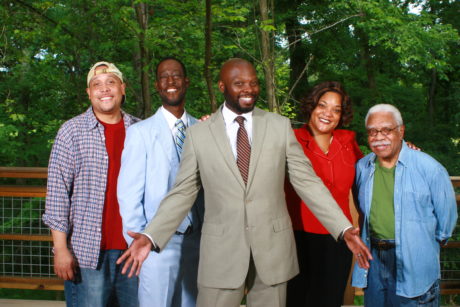Radio Golf, expertly directed by Terry Spann, and written by the late, esteemed playwright August Wilson, is a powerful study of Black men with two different approaches to progressing in a country ruled by Whites. Covering the issues of race relations, poverty, gentrification and police brutality, the play is the finale of what Wilson called his “American Century Cycle.”

Taking place in the office of Bedford Hills Redevelopment Inc., in the Hill District of Pittsburgh, Pennsylvania in 1997 (complete with a poster of Tiger Woods hung on the office wall), the play follows Harmond Wilks (the excellent DeJeanette Horne) who is a candidate to be the Mayor of Pittsburgh. Wilks grew up in The Hill, a neighborhood of 3,500 “Black folks” who don’t vote, but “carry symbolic weight.”
Wilks’ plan is to declare the Hill District blighted and “not fit to live in” and re-name the Hill “Bedford Hill,” complete with the to-be-built Sarah Degree Health Center, a Whole Foods grocery store and a Starbucks—all funded with pending Federal money.
Wilks is boosted by his wife Mame (played with panache by two-time Watch Award winner Lolita Marie, Horne’s real-life wife) who is up for a public relations job with the Governor’s office. She is a strong confidant and speech writer for her husband.
Wilks’ business partner is Roosevelt Hicks (the electrifying Baakari Wilder) who works for Melon Bank and runs a golf camp for kids. Hicks is cozy with rich (off stage) businessman Bernie Smith, who needs a Black face to run a radio station so he can snag a tax break. Hicks worships the dollar and golf, which gives him the “best feeling in my life” and affords the Black man, he believes, a path to a better life, a life where a Black man does not have to “crawl and hide under a rock.”
Enter Sterling Johnson, played with spellbinding realism by Mack Leamon. Johnson is a handyman (who claims to belong to a union of one) and sage of the street, who once robbed a bank because he “wanted to know what it’s like to have some money.” It turns out he and Wilks go way back—he once punched out Wilks when they were kids—and he knew Wilks twin brother, Raymond Wilks, who was a Grambling College football player who was killed in Vietnam. Raymond didn’t go into his father’s family business, Wilks Realty.
The character that overturns the proverbial apple cart is Elder Joseph Barlow, played powerfully by the terrific, stage-commanding John Askew Sr. The seemingly out-of-it old man prattles on and on about needing “$300 to bury a dog,” but what he really needs is a lawyer in his fight to keep his house on Wiley Street, which Wilks apparently owns through his corporation.
“They don’t let no Black man be a mayor!” Barlow insists, upon hearing about Wilks’ plan to run for that office. The mayor has “too many keys, more keys than a janitor…they aren’t going to let you have all the keys.” Barlow, a man who has seen a lot since being born in 1918, thinks that the powers that be in the city will “change the rules” if Wilks becomes mayor.
The idealistic Wilks will have none of that, insisting that no one is above the law: “If elected I’m going to change all that.” According to Wilks, there’s four approaches to fixing the system: those who want to build it up from within, those who want to tear it down, those who don’t know how to fix it, and those who don’t want to be bothered with fixing it. Wilks insists he will be the mayor for everyone in the city. “What’s wrong with being the mayor for Black folks?” asks Barlow.
Much of the story focuses on the wrestling match over 1839 Wiley Street, a Federalist brick house with a red door and a staircase made of Brazilian hardwood; it’s the house of Wilson’s reoccurring character Aunt Esther. It’s an old plot device too: a piece of property or a town stands in the way of the “progress” of development. As the story progresses, we find that Wilks has family ties to one of the other male characters and Aunt Esther.

Opposing Wilks and Hicks in their plans for urban renewal is man-of-the-people Johnson who paints the dilemma in good-vs-evil terms. “You the cowboys, we the Indians!” There is eventually a back-and-forth battle over the ownership of and possible demolition of the house on 1839 Wiley Street. Wilson presents two opposing philosophies of how minorities should better themselves: through gradual accommodation or complete self-sufficiency. As the story progresses, we know Hicks is all about accommodation and we see Wilks wrestle with what side he is on.
I loved the radio sound effects of WBCT “Don’t touch it, it will burn you!” created by Sound Designer Russell Silber. Jason Ellis did an excellent job choreographing Wilks’ and Hicks’ “Hail, Hail, the Gang’s All Here” handshake-dance. I liked the simple yet effective set design by Randy Sena. Spann evoked great performances from his cast.
I loved this play. The cast overall was as powerfully good as any I’ve seen this year; Askew and Leamon made their characters into flesh, blood and spirit right before my eyes. See this play, catch these performances, and learn what great art looks like.
Running Time: Two hours and 30 minutes, with a 10-minute intermission.
Radio Golf plays through Saturday, August 27, 2016 at Hard Bargain Players at Hard Bargain Amphitheater – 2001 Bryan Point Road, in Accokeek, MD. For tickets, purchase them online.
LINK:
A Preview of ‘Radio Golf’ Which Opens This Friday, August 12th @8PM at Hard Bargain Players by Terry Spann.
RATING:





